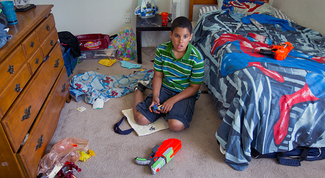 Steavon's mother is a single parent. Steavon's mother is a single parent. Tags: class, economic sociology, inequality, marriage/family, income inequality, single parents, 00 to 05 mins Year: 2012 Length: 5:16 Access: New York Times Summary: In this video, The New York Times notes that "as a single mother of three, Jessica Schairer falls in the middle of a sharp debate about how economic inequality is increasingly linked to changes in family structure" (see accompanying article and infographic). Through Jessica's story as a working class mother, it illustrates how family structure can exacerbate already existing class inequalities. Jessica explains her stress trying to raise her children as a single parent, including the difficulties of getting home and needing to meet the needs of children and her inability to pay for all the activities her children would like to do. This is contrasted with her married supervisor at work, who is able to rely on a partner when going home from work. The narrator notes that like Jessica's supervisor, college-educated people are more likely to marry and that their combined resources help provide an additional advantage in raising their income, which provides additional advantages conferred to their children. The narrator also notes that "many children of single parents flourish, but studies have shown that on average, children raised by single parents are more likely to fall into poverty, do poorly in school, or become teenage parents." The accompanying article provides many additional statistics. For example, it notes that "estimates vary widely, but scholars have said that changes in marriage patterns — as opposed to changes in individual earnings — may account for as much as 40 percent of the growth in certain measures of inequality." Viewers can be encouraged to consider how class and family structure intersect to shape intergenerational economic inequality, and how the jobs of low income workers face more job-related difficulties in meeting family needs as compared to salaried professional workers. Image by Stephen Crowley/New York Times Submitted By: Paul Dean
4 Comments
Anni
9/27/2012 03:59:16 am
Just to let you know, unfortunately this video is no longer available from the NYtimes website.
Reply
Paul Dean
9/27/2012 07:56:11 am
We fixed the link. Use the link above (http://www.nytimes.com/2012/07/15/us/two-classes-in-america-divided-by-i-do.html?pagewanted=all) and scroll down to the second paragraph. There is an image under the label "multimedia". You can access the video there.
Reply
Manuel Franco
7/30/2023 11:49:44 am
I just want to say Thank You to everyone who supported me through the years. My name is Manuel Franco, New Berlin, Wisconsin. My story of how I won the Powerball lottery of $768.4M is a bit of a tale. I have been playing Powerball tickets for 6 years now since I turned 18. I bought my first ticket on my 18 birthday. I was feeling very lucky that day because I had contacted Dr. Odunga Michael to help me with the winning Powerball numbers. I really had that great great feeling that I looked at the camera wanting to wink at it. I only did a tiny part of it and trusted him. He gave me the numbers after I played a couple other tickets along with it for $10. I checked my ticket after the winnings came online and saw the numbers were correct including the Power play. I screamed for about 10 minutes because it felt like a dream. I had won $768.4M. You can check my winning testimony with the lottery officials just with my name search. Thank you Dr Odunga. Well, his email is [email protected] and you can also call or Whats-app him at +2348167159012 so you guys can contact him
Reply
mark hold
7/8/2024 07:40:32 am
Herbal Penis Enlargement product is 100% guaranteed to Enlarge and get a better ERECTION, the reason why most people are finding it difficult to enlarge Penis is that they believe in medical reports, drugs and medical treatment which is not helpful for Penis Enlargement. Natural roots/herbs are the best remedies which can easily Enlarge your Penis permanently Contact Dr MOSES BUBA via Email: [email protected] or via WhatsApp: +2349060529305. for Natural root and herbal remedies put together to help Enlarge manhood and Erect healthily. I also learn that Dr MOSES BUBA also can cure other types of diseases, HEPATITIS B,DIABETICS,CANCER,HPV,LOW SPERM CAM, HIV/STDS, FIBROSIS LOST OF WEIGHT, BREAST ENLARGEMENT, HIPS and BUMS ENLARGEMENT etc .
Reply
Leave a Reply. |
Tags
All
.
Got any videos?
Are you finding useful videos for your classes? Do you have good videos you use in your own classes? Please consider submitting your videos here and helping us build our database!
|
 RSS Feed
RSS Feed
